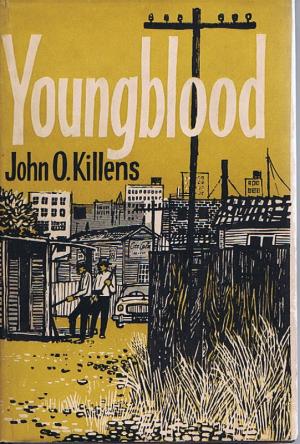Inspiring Older Readers
 posted on 13 Oct 2016
posted on 13 Oct 2016
Just who was John Oliver Killens?
When I’m out and about book hunting I have a couple of categories of novels that I always keep an eye open for - anything that is written by British working class authors and /or novels of social protest from the 1950s or 60s. Quite a lot of the latter tend to be American but not exclusively so – I’m also keen to find books in translation that tackle similar subject matter. Books in both of these categories deal with topics that has been a passion of mine throughout my adult life and I have come to realise that, despite my interest, there is a body of writing out there that I have never heard of and very rarely see. Often these are books that had a brief moment in the spotlight when they were published but have slowly become buried, fallen out of print and the titles and their authors hardly ever mentioned. I have come to believe that the neglect shown by publishers and the literary hierarchy towards many of these titles is actually the result of a kind of institutional discrimination that favours a selected, largely middle class canon at the expense of working class or alternative world views.
Not so long ago I was fortunate enough to stumble over a copy of Youngblood by a US novelist called John Oliver Killens and it was immediately obvious from the blurb on the jacket of my edition published in the UK by The Bodley Head, that this was a black author writing about the issue of civil rights and discrimination in the American South during the 1960s. I have to admit – and this may just be an indication of the depth of my own ignorance – I had never come across this novel or the authors name before. Now, I’ve been a reader, an inveterate book buyer and a bookseller for many years and so I’d be willing to bet that outside of a quite small group of specialist literary critics, teachers or commentators, my ignorance of the book and it’s writer is probably shared with most people.
A bit of research soon uncovers that Killens (1916 – 1987) was a significant cultural figure in the Civil Rights Movement in the US and that the novel Youngblood was his first major contribution to that struggle. The book was published in 1956 and has been described by The New Georgia Encyclopaedia as ‘a classic of social protest fiction’ written in New York where Killens and three friends had set up the Harlem Writers Guild. The book however is set in his native Macon (renamed Crossroads in the novel), Georgia, and deals with the struggles of the poor, rural black community in the Jim Crow era as they struggle to maintain a sense of humanity and dignity in the face of brutal discrimination and oppression.
Killens was a great admirer of another black social protest novelist, Richard Wright, author of the classic novel of segregation, Native Son. Like Wright, Killens was committed to the idea of art and culture as a tool of social change and he is credited with saying that ''There is no such thing as art for art's sake. All art is propaganda, although there is much propaganda that is not art.'' Although he went on to write a number of other novels that tackled controversial issues head-on – his book The Cotillion, for example, deals with issues of class and social climbing within the black community – it is Youngblood that seems to be given the most significant critical acclaim.
However, it is his work as a black activist within the Civil Rights movement that gives Killens an added dimension. He personally knew both Martin Luther King Jnr and Malcolm X but his instincts were those of the radical :
''My fight is not to be a white man in a black skin, but to inject some black blood, some black intelligence into the pallid mainstream of American life.''
The US based website, aalbc.com, dedicated to the issue of black American literature, says of his later years:
“Although Killens remained involved with various political efforts into the 1980s the FBI kept a file on him for five decades'he devoted an increasing amount of time to his work as an educator and cultural organizer. He held appointments at the New School for Social Research, Fisk University, Columbia University, Howard University, Bronx Community College and Medgar Evers College in his home borough of Brooklyn. He generally insisted on running a writing workshop for the community in addition to his responsibilities to the students enrolled on campus.”
The significance of the work of John Oliver Killens is clearly being kept alive in the US by a range of dedicated and politically aware devotees but I really struggled to find anything much at all about the author or his book that has UK origins. I’ve yet to read the book myself but this simple bit of digging around has convinced me that I really should do so soon and it also prompts me to ask questions about why the book is so hard to find in the UK – the abebooks website has no copies available from booksellers in this country and on Amazon even paperback reprints are very expensive and many ship from the USA.
I can’t help but feel that our cultural and political life is hugely diminished when we allow significant books and important authors to slip off our radar in this way. It’s time John Oliver Killens had more of a profile over here and – maybe - time for a more popular reprint?
Terry Potter
October 2016